Global Horizons Showcases International Trade Insights in Collaboration with Leading Industry Bodies
The Association of Translation Companies is collaborating with the Chartered Institute of Export & International…

The ATC’s Member of the Month in July 2021 is Cintra Language Services, a not-for-profit social enterprise specialising in public sector translation and interpreting. We caught up with Cintra’s Head of Business Operations Ursula Fairhurst on 24/7 public sector availability, serving the police forces, training and supporting interpreters, and developing best practice guidance.
The Cintra Language Services Group includes Cintra Translation and Cintra Interpreting, focusing on public sector work, along with First Edition Translations specialising in commercial translation. “Cintra was originally founded by Cambridge City Council 25 years ago, and although it’s now a separate limited company, we remain a member-owned social enterprise whose profits are put back into developing our services,” says Ursula.

Cintra provides translation and interpreting primarily to the courts, police, local government and healthcare authorities. “We manage over 25,000 interpreting assignments each year, and translate over 15 million words, so our daily work is quite busy – especially dealing with urgent assignments with the 999 service,” Ursula explains.
Cintra is one of the companies contracted on the new National Police Dynamic Procurement System for Language Services and its bookings team operates 24/7, 365 days of the year.
“We get service callouts around the clock. Police officers are busy people, so when they call – no matter what time of the day – they need to trust us to find the right interpreter for the assignment. A big part of our bookings coordinators’ work is to advise how to best manage an enquiry. The assignment could be about an immediate need for an interpreter at the custody suite, or translation of evidence in the form of text messages, or getting ready for a large operation with multiple interpreters required.”
The Police follow PACE, the Police and Criminal Evidence Act, and have 24 hours to interview and charge a suspect, which means that language service companies also have targets to provide an interpreter within a strict time limit. “For us, that means sending the right interpreter, speaking the right language, with the right experience, qualifications and clearances, within two hours, 24/7,” clarifies Ursula.
Cintra puts a lot of effort into supporting and training its interpreters. “We couldn’t do this without very good relationships with our interpreters, waking them up at 3 am to say, can you be at the police station immediately?”
“Interpreting for these assignments can be really tough, so we want to be there for the interpreters to reach out to for support when they need it. We offer a counselling service to interpreters free of charge, so that they can debrief after a distressing case, and our bookings coordinators are available to support them at any time.”
Cintra also organises CPD training courses to interpreters, with recent courses on equality and diversity, modern slavery, and child sexual exploitation. Its HR department guides interpreters through clearance vetting, as well as preparation for Level 6 formal qualification examinations to work at a court setting.
At an operational level, Cintra works closely with the National Police Contract Manager for Language Services, to develop and disseminate best practice. New guidance in the form of the new PAIT scheme, or the guidance on using language services from the College of Policing, are raising awareness and unifying best practice across the forces.
In 2019, Cintra was certified to ISO standard 18841 for interpreting services, going on to become the first company certified to ISO standard 20228 for legal interpreting.
“We’re in a ‘go-now’ mode situation the whole time, but at the end of the day it’s the bigger picture and the quality of our services that matter,” says Ursula. “We are here to make sure people can access public services, regardless of who they are and where they are from.”